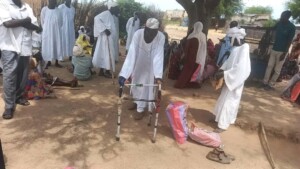Sudan doctors: ‘More people with cholera in rainy season’
The Central Committee of Sudanese Doctors found that more than 200 cholera patients reported to hospitals in North Darfur in the past two weeks. The epidemic has expanded from Khartoum to the western regions.
The Central Committee of Sudanese Doctors found that more than 200 cholera patients reported to hospitals in North Darfur in the past two weeks. The epidemic has expanded from Khartoum to the western regions.
In a new report released yesterday, the Central Committee of Sudanese Doctors said it expects an increase in the rate of cholera infections with the start of the rainy season. 'The epidemic has expanded westwards towards the states of Kordofan and Darfur. Especially at risk are the camps for displaced people.'
Starting mid-June, torrential rains swept through camps, leaving the streets flooded and numbers of families homeless.
According to the report there is a decrease in the rate of infections in Khartoum state. During the past two days hospitals in the state recorded 69 new cholera cases: in Elbanjadeed, Bashair, Bahri Ibrahim Malik, Omdurman, and the Academic Hospital.
In North Darfur, Shangil Tobaya, Tawila and Kabkabiya localities have recorded a total 249 cases of cholera during the past two weeks, while the death toll has risen to sixteen cases in these localities.
The number of patients in En Nahud, West Kordofan, amounted to sixteen. The hospital administration told the doctors' committee that they suffer from food poisoning, but did not disclose the results of the laboratory tests.
385 cases, including 22 deaths, have been recorded in En Nahud hospital so far, the report reads. There were 11 patients in the isolation centre on Wednesday.
In the capital of East Darfur, Ed Daein, the report found that the total number of cholera cases in the main hospital is 27 people.
Decrease in number of cholera infections in Khartoum, according to Central Sudanese Doctors' Committee
An activist campaigning against cholera in northern Khartoum's Teiba El Ahamda district, however, said that the disease returned to the area after a significant reduction in the past two weeks. “The health centre in the district recorded ten cases, including to basic school pupils, on Wednesday and Thursday.”
Schools
The committee considered the Ministry of Education's decision to re-open the schools as 'a great violation in the light of the current health situation, with the complete absence of safety and security measures'.
There were nationwide calls to postpone the opening of the new school year by doctors and opposition parties in order to contain the spread of the cholera epidemic. The Sudanese Ministry of Education has decided to continue with the school year, but authorities in Delling (South Kordofan) for example, postponed the opening of the basic schools to next week.
The National Epidemiological Corporation has announced an awareness raising campaign in the country’s schools, as the Sudanese authorities continue to ignore laboratory confirmations about cholera, and refuse to postpone the opening of the new school year in order to contain the spread of the infection.











 and then
and then